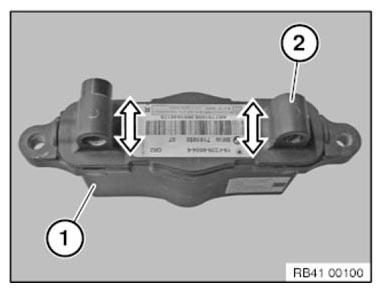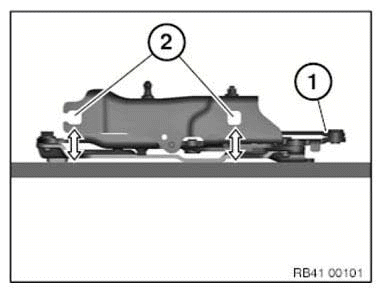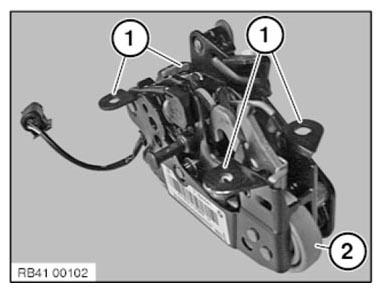BMW 7 Series: Check Actuator
Necessary preliminary tasks
- REMOVE ACTUATOR
Check actuator for damage.
ACTUATOR CHART


Fig. 411: Checking Actuator
CHECK HINGE FOR ENGINE COMPARTMENT LID
Necessary preliminary tasks
- REMOVE HINGE FOR ENGINE COMPARTMENT LID
Open and close hinge (1).
Place hinge (1) on a level surface. Check holes (2) for parallelism with surface.
HINGE CHART


Fig. 412: Checking Hinge Holes For Parallelism With Surface
CHECKING HOOD/BONNET LOCKS
Necessary preliminary tasks
- Remove hood/bonnet locks.
Check hood/bonnet locks for damage; replace if necessary.
HOOD/BONNET LOCKS CHART



Fig. 413: Identifying Hood/Bonnet Lock Retaining Tabs And Spring
READ NEXT:
 Removing And Installing Engine Compartment Lid
Removing And Installing Engine Compartment Lid
WARNING: Danger of injury!
Support engine compartment lid in fully opened position with suitable
apparatus.
IMPORTANT: These instructions only apply to vehicles without active
pedestrian protection !
 Adjusting Tailgate
Adjusting Tailgate
IMPORTANT: Do not damage adjoining body parts.
Minor corrections (realignment work) are permitted if the existing adjustment
options are not sufficient.
Read contents of BODY, GENERAL.
Observe GAP D
SEE MORE:
 Integrated Universal Remote Control
Integrated Universal Remote Control
Vehicle features and
options
This chapter describes all standard, country-specific
and optional features offered with the series.
It also describes features and functions that are
not necessarily available in your vehicle, e.g., due
to the selected options or country versions. This
also applies to
 Hands-Free System, Microphone, Speaker
Hands-Free System, Microphone, Speaker
REMOVING AND INSTALLING/REPLACING HANDS-FREE MICROPHONE, DRIVER'S
SIDE
Lever out microphone cover (1) at front in direction of arrow.
Disconnect plug connection underneath and remove microphone cover (1).
Fig. 13: Removing Microphone Cover
Unlock retaining lug (1) and feed out hands-free microphon
© 2019-2026 Copyright www.bmw7g11.com

